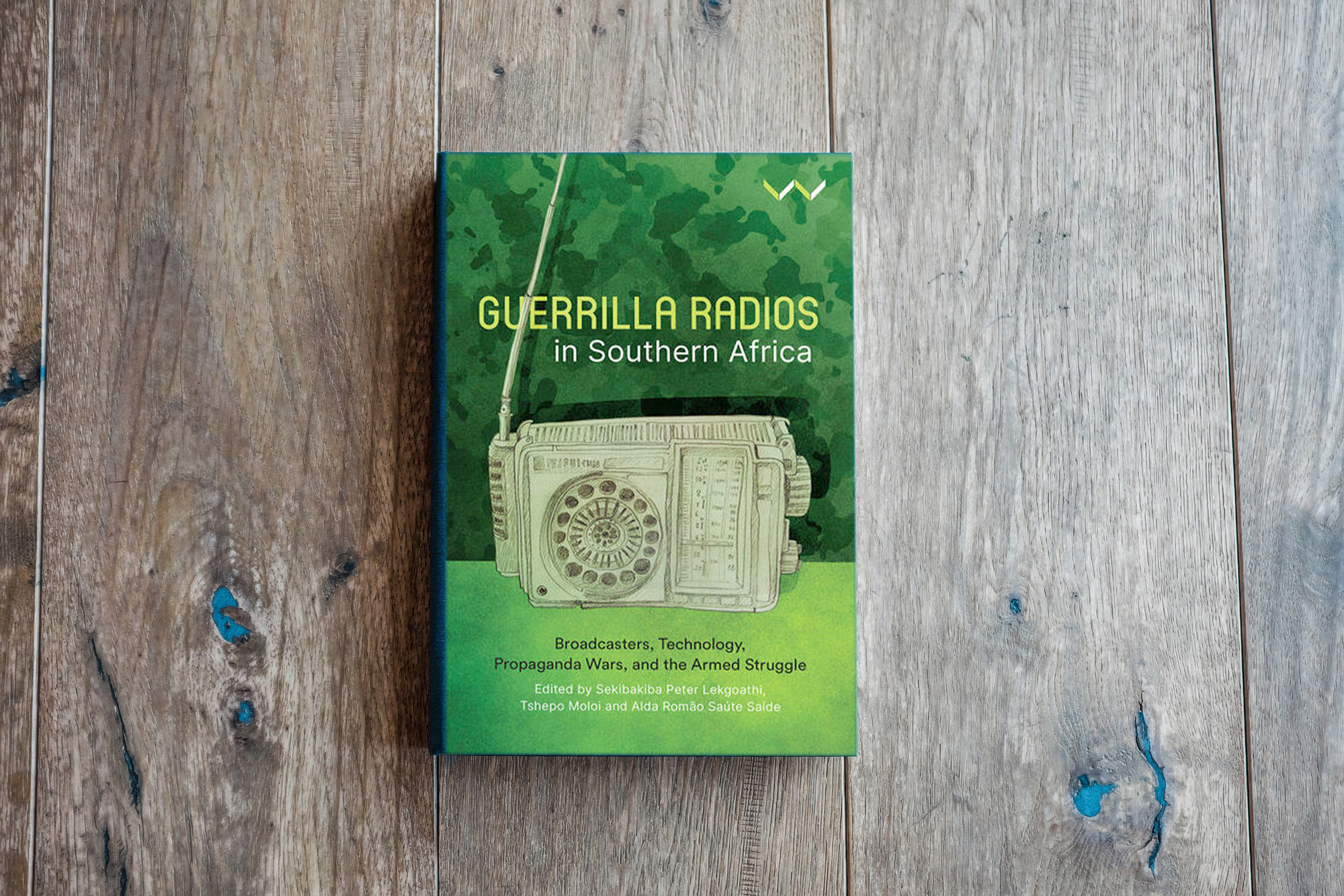New Books | Radio in the fight for freedom
Radio broadcasting was a powerful technology for disseminating the messages of the liberation movements and for mobilising people against white minority rule in the region.
Author:
11 April 2022

This is a lightly edited excerpt from Guerrilla Radios in Southern Africa: Broadcasters, Technology, Propaganda Wars and the Armed Struggle (Wits University Press, 2021), edited by Sekibakiba Peter Lekgoathi, Tshepo Moloi and Alda Romão Saúte Saíde.
Since the 1950s radio has been the predominant medium of mass communication in Africa. Not only was radio broadcasting employed by the colonial states in the service of empire, but the liberation forces also appropriated it as a weapon in the struggle for independence. With the turn to the armed struggle and movement into exile in the early 1960s, access to a radio station became a top priority for the nationalist movements in southern Africa. Through radio, the guerrilla movements sought to maintain a sonic presence among their supporters at home. It was a means through which they could shape their supporters’ political views and behaviour – and more especially their activities in resisting white rule.
The liberation movements also, of course, used other media (particularly print), but radio occupied a very special place in the struggle for independence in southern Africa. Sound had the most appeal. Through radio, the liberation movements could address their supporters instantly and directly behind enemy lines. They could maintain their presence at home without being physically present. The appropriation of radio by the nationalist movements nevertheless caused severe nervousness on the part of the white minority regimes in the region, unwilling to surrender their monopoly over the airwaves.
Radio first came to Africa as a tool of empire. This was true of radio throughout southern Africa, where this modern technology was inaugurated, as Mhoze Chikowero writes in chapter four of this volume, “as an instrument of contending European imperial propaganda wars against each other and on colonised Africans”. Radio symbolised a European presence.
The first broadcasting stations were mainly in European languages and directed primarily at white audiences in the colonies. The first propaganda radio that made a concerted effort to influence political opinion in southern Africa was the Nazi station Radio Zeesen. Broadcasting in Afrikaans in the 1930s, before World War II, this radio was aimed at certain elements in Namibia and South Africa that were sympathetic to the Nazi cause. Radio broadcasting in African languages was first established in the early 1940s, against the backdrop of growing interracial mistrust during the war. There were growing fears among the white rulers at the time that Africans would scupper the war effort unless they received regular war communiques, in their own languages, that urged support for the war. Those who championed radio broadcasting in African languages saw it as the most effective tool for educating the masses and instilling loyalty to the empire.
Related article:
In South Africa during the apartheid era, as Sekibakiba Lekgoathi argues, the South African Broadcasting Corporation (SABC) introduced African language radio stations that were ethnically divided. Collectively named Radio Bantu, radio in African languages was introduced to reinforce the Bantustan policy of ethnic separatism. Radio “became a critical tool of modern technology for achieving the ambitions of those who were determined to govern the Black population by domination rather than consent”. It was in the interest of those in power to control and contain African access to radio, and when African nationalist movements flipped the script and adopted radio as a means for contesting colonial domination and attaining liberation, a protracted warfare of the airwaves ensued.
Radio played an inimitable role in the liberation struggle in southern Africa, particularly after the turn to the armed struggle. It became a tool for pushing the liberation struggle propaganda and galvanising opposition against white minority rule. Yet no substantial work has been conducted that has made an effort to situate guerrilla radios within a broader regional context – apart from some cursory hints in the voluminous body of essays, memoirs, biographies and autobiographies of former activists and political leaders in southern Africa about the role that radio played in the liberation struggle. Most of the works produced tend to be parochial in approach, analysing each guerrilla radio within the framework of the nation-state. There has been very little sustained research to provide historical and social analyses of the use of sound in the liberation struggle in the region as a whole. We know very little about how the nationalist movements were able to engage in a war of the airwaves against the white minority regimes, or to capture the hearts and minds of the people from their bases in exile. We know even less about content production and reception of the messages broadcast on these radio stations.
Guerrilla Radios in Southern Africa is a collection of chapters on the histories of the radios attached to the armed wings of the liberation movements in the region. It is about the experiences of the broadcasters and listeners during the era of the armed struggle. Using archival sources such as sound recordings of the guerrilla radio stations, together with interviews conducted with former broadcasters and listeners, the chapters contained in this volume ask complex questions about the social histories of these stations. They explore the workings of propaganda and counter-propaganda and probe the effects the radios had on the activists and supporters of the liberation movements – and, on the other hand, on the colonial counter-insurgency projects. The chapters also examine the relationships that these radios forged at their multiple sites of operation in host countries, and look at international solidarity and support, specifically for radio broadcasting initiatives. In the end, this book pushes the frontiers of knowledge production beyond exploration of broadcast content toward a more nuanced conception of radio as a medium formed by social and political processes.
Guerrilla radio broadcasting, we argue, became a very powerful technology for disseminating insurgent propaganda messages of the liberation movements and for mobilising African workers, peasants, students and youth in the struggle against white minority domination in the entire region. From Angola to Mozambique, and from Zimbabwe to Namibia through to South Africa, the modern technology of radio provided the liberation movements in exile with a platform for an aural or sonic presence among the followers of the liberation movements back home. It became an effective instrument for propagating the ideologies of the liberation movements and for countering the propaganda messages of the oppressive white minority regimes.
Related article:
The cheapest and most direct medium of communication, guerrilla radios transcended boundaries and were widely listened to, albeit illegally. These radio stations existed, according to Marissa Moorman, “beyond the jurisdiction of colonial law but within the broadcast range of the colonial state and the territory it claimed”. Their public and legal operation behind enemy lines and outside the reach of the colonial or apartheid laws, coupled with the reality that many people within the colonial territories tuned in, caused severe anxiety on the part of the state. We borrow the concept of the nervous condition of the colonial state from Mhoze Chikowero (in this volume), who in turn coined the term from Nancy Rose Hunt’s work on the condition of the Belgian colonial state in the Congo. Because of the invisibility and transience of sound and the insecurity of the authorities, the police and the military were put on the defensive. As Moorman shows in chapter three of this volume, the colonial state listened in to the guerrilla radios and transcribed the broadcast messages – and arrested and prosecuted anyone caught listening. Quite commonly, as Sifiso Mxolisi Ndlovu illustrates in chapter nine, the white minority regimes sought to counter guerrilla radio propaganda with their own propaganda disseminated through state channels such as Radio Republic of South Africa (Radio RSA). Simultaneously, surveillance was put on guerrilla radios and their frequencies were jammed.
The support that the independent African countries (Egypt, Algeria, Ethiopia, Ghana, Tanzania, Zambia, Congo-Brazzaville, Congo-Kinshasa and Angola, among others) and other international solidarity groups and governments gave to the southern African liberation movements in exile was immense. Yet the existing studies on the liberation struggles only provide perfunctory hints, at best, of this. Very few historical works have uncovered the multi-layered histories of these radios and analysed the dynamics of the relationships fostered at the points of operation in exile. The paucity of regional scholarship on the liberation struggle generally, and on broadcasting in particular, is unfortunate given the region’s shared experiences of white minority rule, the continental initiatives to fight against it, and the growing significance of radio as a medium of mass communication in the era after World War II.
In his chapter in this volume Lekgoathi shows that substantial financial and logistical support was advanced to the African National Congress’s Radio Freedom by governments, solidarity groups, and civil society organisations in eastern and western Europe (the Soviet Union, the German Democratic Republic, the Nordic countries, the Netherlands and others). While the fight against the injustices of the apartheid system was important, these countries and support groups also had other underlying motivations. During the Cold War, the communist bloc supported the liberation movements in order to expand their ideological influence in Africa. The Scandinavian countries and the Netherlands saw support for Radio Freedom as part of a larger struggle against state monopoly of the airwaves and the promotion of media pluralism and democracy. Informed by their pan-Africanist outlook and commitment to a decolonised Africa, sovereign African countries such as Egypt, Ethiopia, Tanzania and Zambia (despite their own struggling economies and sociopolitical challenges) accommodated these radios on the external services of their national broadcasters. The sacrifices they made were significant. Some endured spates of military incursions and air bombardment by the South African military that destabilised the entire region. Radio Freedom, Voice of the Pan Africanist Congress, Voice of Namibia, A Voz da Frelimo, Voice of the Revolution, Voice of Zimbabwe and others benefitted greatly from such magnanimity by the frontline states.


